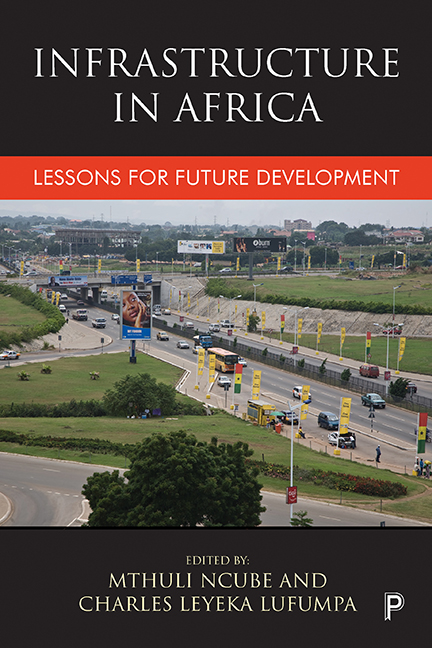Book contents
- Frontmatter
- Contents
- List of figures
- List of tables
- List of boxes
- Notes on contributors
- Acknowledgements
- Foreword
- Introduction: Infrastructure in African development
- Part 1 Spatial and demographic contexts
- Part 2 Sector-specific issues
- Part 3 Regional issues
- Part 4 Financing issues
- Part 5 Concluding remarks
- Index
fifteen - Innovative financing for infrastructure: Africa50 Fund issues
Published online by Cambridge University Press: 05 April 2022
- Frontmatter
- Contents
- List of figures
- List of tables
- List of boxes
- Notes on contributors
- Acknowledgements
- Foreword
- Introduction: Infrastructure in African development
- Part 1 Spatial and demographic contexts
- Part 2 Sector-specific issues
- Part 3 Regional issues
- Part 4 Financing issues
- Part 5 Concluding remarks
- Index
Summary
Introduction
The role of infrastructure in Africa's sustainable development is well documented and accepted. The intriguing question that needs urgent answering is: why has the infrastructure financing gap remained relatively large and persistent? Why has the private sector not played a more active role in providing the necessary funding? Why are less as opposed to more infrastructure projects being successfully implemented in a continent desperate for transformation while world financial markets are awash with capital? Ehlers (2014) argues that the persistent funding gap is an outcome of the failures of countries to reconcile available finance with bankable projects.
There are a number of efforts that have been undertaken to rethink how additional resources can be mobilized and private sector participation increased. These efforts include policy and institutional reforms that seek to reduce risks to ramp up both short- and long-term finance. There have been attempts by countries to enhance project designs and ensure contracts are respected and adequately enforced in ways such that infrastructure investments deliver the anticipated outcomes. A balance needs to be achieved to get a win-win situation for both private gains and social outcomes. The challenge for both private and public sector participants is to design contracts where the risks and returns are distributed in an incentive-compatible way (Ehlers, 2014). There is need to broaden the spectrum of participants in infrastructure investments by identifying new sources and vehicles for finance suitable for various stages of given projects. For example, infrastructure bonds are more suitable instruments for large institutional investors, such as pension funds and insurance companies, while project finance and other structured instruments may be more suitable for banks.
Since 2009, the African Development Bank (AfDB) and other development partners such as the World Bank and the African Union have embarked on more aggressively tackling the infrastructure challenges of the continent. In 2009 the World Bank and major donors supported the African Infrastructure Country Diagnostic (AICD) study. This study, which formed the baseline against improvements in infrastructure services, has since been costed and priority investments and policy reforms around the Program for Infrastructure Development in Africa (PIDA) developed. The subsequent Africa Infrastructure Knowledge Program being spearheaded by AfDB builds on the AICD.
- Type
- Chapter
- Information
- Infrastructure in AfricaLessons for Future Development, pp. 615 - 640Publisher: Bristol University PressPrint publication year: 2017



